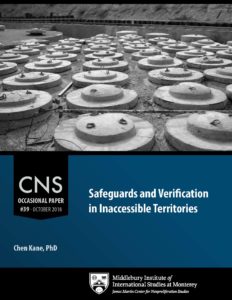October 23, 2018
Chen Kane, PhD
 The paper aims to assist the international community and international organizations (IOs), such as the International Atomic Energy Agency (IAEA) and the Organisation for the Prohibition of Chemical Weapons (OPCW), to better prepare for challenges related to verification and safeguards of nuclear materials, chemical weapons, and facilities in inaccessible territories. The paper identifies lessons from past and ongoing cases (Iraq, Libya, Syria, Fukushima/Japan, and Crimea/Ukraine) and presents policy, legal, and technical recommendations to the IAEA, OPCW, and their member states to overcome some of these challenges.
The paper aims to assist the international community and international organizations (IOs), such as the International Atomic Energy Agency (IAEA) and the Organisation for the Prohibition of Chemical Weapons (OPCW), to better prepare for challenges related to verification and safeguards of nuclear materials, chemical weapons, and facilities in inaccessible territories. The paper identifies lessons from past and ongoing cases (Iraq, Libya, Syria, Fukushima/Japan, and Crimea/Ukraine) and presents policy, legal, and technical recommendations to the IAEA, OPCW, and their member states to overcome some of these challenges.
The challenges in verifying and safeguarding nuclear materials in inaccessible sites have existed for decades. Past cases include Chernobyl, Three Mile Island, and Serbia during the Balkan Wars of the 1990s. Nevertheless, the number of cases in which international organizations such as the IAEA and the OPCW had to verify the status of declared materials in territories they could not access increased significantly since 2010.
This report discusses three categories of situations from which the IAEA and the OPCW have been barred from accessing sensitive materials or facilities. One category consists of locations that are insecure or unsafe and thus involve high risk to IO staff such as in Libya, Iraq, and Fukushima (Japan). The other two categories involve territory over which the state responsible for securing access does not have de facto control. This occurs when the site is controlled by either nonstate actors, such as some sites in Iraq and Syria, or by another state, as in Crimea, Ukraine. In many of these instances, securing access involves a range of political sensitivities, such as civil war, occupation, or natural disaster, which has broader implications and complexities beyond nuclear or chemical nonproliferation, further complicating an IO’s ability to gain access to the site or use other means to gather required information. Each of these situations poses different political, legal, and technical challenges and limitations, but they also offer potential novel solutions.
